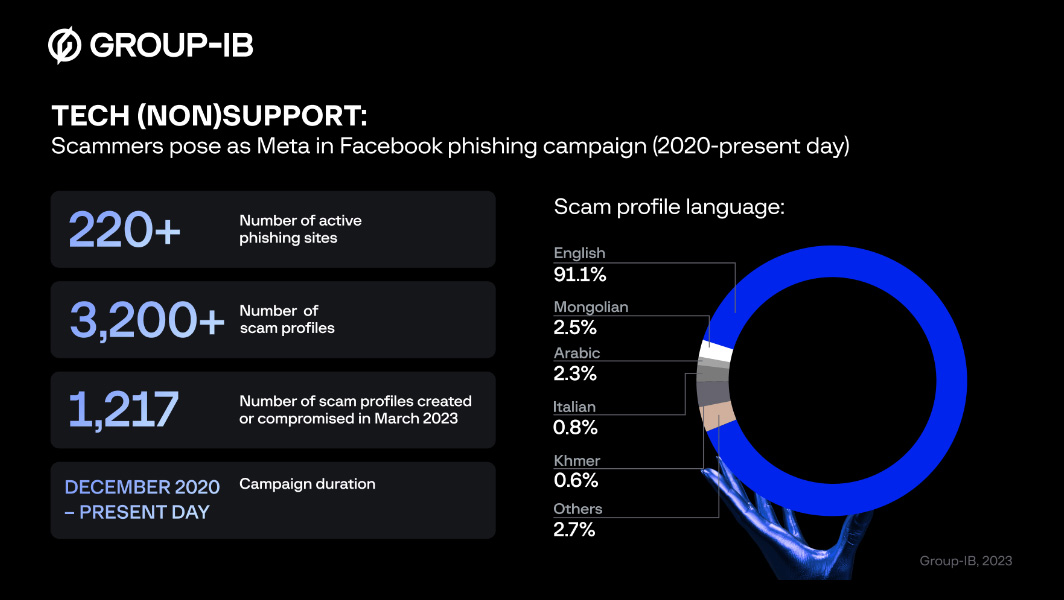News
Facebook Scammers Pose As Support Staff On 3,200 Fake Profiles
A leading cybersecurity firm’s Dubai-based team uncovered a widespread scam targeting celebrities, businesses, sports teams, and individual accounts.

Global cybersecurity experts Group-IB today published new research into a worldwide phishing campaign carried out on Facebook by cybercriminals impersonating Meta (Facebook’s parent company) support staff.
Between February and March 2023, Group-IB researchers based in Dubai identified over 3,200 Facebook profiles falsely claiming to be written by Meta support staff in over 20 languages. Upon discovering the scammers’ accounts, Group-IB’s Computer Emergency Response Team shared information with Facebook, which it must be noted had already deleted some of the offending profiles.

The cybercriminals’ goal was to hack the Facebook accounts of public figures and celebrities, businesses, sports teams, and individual accounts. As part of the elaborate scam, cookie data, and session hijacking were employed, though the criminals mostly used traditional phishing techniques to trick people into voluntarily entering email and password information.
Group-IB researchers began tracking this widespread scam in February 2023. As well as 3,200 fake Facebook profiles containing scam posts, the cybersecurity experts also discovered 220 websites intended to trick users into parting with their data.
The Details Of The Scam
This Facebook scammers used social engineering techniques to trick users into thinking their accounts were marked for suspension due to copyright violations. If victims attempted to verify their profile to prevent it from being blocked, they would be taken to a phishing website, where they were presented with a page that contained official-looking Meta or Facebook branding.
Also Read: Filmmaker Uses AI To Visualize Thousands Of Leaked Passwords
“Cybercriminals can use compromised accounts to launch further phishing attacks. Individuals can suffer legal and reputational damage [and] threat actors could also gain access to the victim’s financial services [and] hold compromised accounts for ransom, demanding payment from the victim for retrieval of the account,” says Sharef Hlal, Head of Group-IB’s Digital Risk Protection Analytics Team.
Group-IB recommends social network users ensure that their passwords are “strong and unique, and that they enable two-factor authentication (2FA) to provide an extra layer of security”. In addition, if you’re ever directed away from official social media platform pages, it’s a good idea to closely check the URL to ensure it’s legitimate.
News
Google Releases Veo 2 AI Video Tool To MENA Users
The state-of-the-art video generation model is now available in Gemini, offering realistic AI-generated videos with better physics, motion, and detail.

Starting today, users of Gemini Advanced in the MENA region — and globally — can tap into Veo 2, Google’s next-generation video model.
Originally unveiled in 2024, Veo 2 has now been fully integrated into Gemini, supporting multiple languages including Arabic and English. The rollout now brings Google’s most advanced video AI directly into the hands of everyday users.
Veo 2 builds on the foundations of its predecessor with a more sophisticated understanding of the physical world. It’s designed to produce high-fidelity video content with cinematic detail, realistic motion, and greater visual consistency across a wide range of subjects and styles. Whether recreating natural landscapes, human interactions, or stylized environments, the model is capable of interpreting and translating written prompts into eight-second 720p videos that feel almost handcrafted.
Users can generate content directly through the Gemini platform — either via the web or mobile apps. The experience is pretty straightforward: users enter a text-based prompt, and Veo 2 returns a video in 16:9 landscape format, delivered as an MP4 file. These aren’t just generic clips — they can reflect creative, abstract, or highly specific scenarios, making the tool especially useful for content creators, marketers, or anyone experimenting with visual storytelling.
Also Read: Getting Started With Google Gemini: A Beginner’s Guide
To ensure transparency, each video is embedded with SynthID — a digital watermark developed by Google’s DeepMind. The watermark is invisible to the human eye but persists across editing, compression, and sharing. It identifies the video as AI-generated, addressing concerns around misinformation and media authenticity.
While Veo 2 is still in its early phases of public rollout, the technology is part of a broader push by Google to democratize advanced AI tools. With text-to-image, code generation, and now video creation integrated into Gemini, Google is positioning the platform as a full-spectrum creative assistant.
Access to Veo 2 starts today and will continue expanding in the coming weeks. Interested users can try it out at gemini.google.com or through the Gemini app on Android and iOS.


























